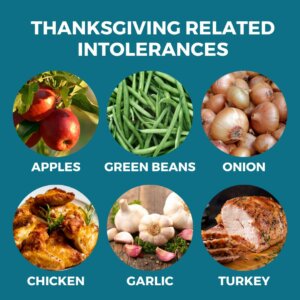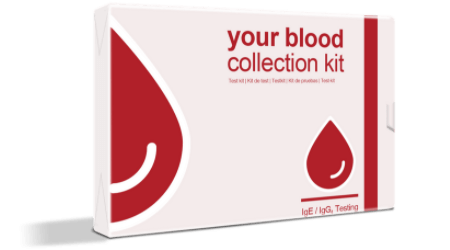The holiday is a fun time to spend with loved ones. Or it should be. Those with food allergies can often feel like they are on the outside of things since the holiday often means unknown foods (and ingredients) from people who aren’t used to dealing with allergies. You’ll be happy to know that dealing with allergies at Thanksgiving isn’t impossible, however. You just need to approach it with the right tips and tricks to help you out.
Both allergies and Thanksgiving intolerances are much more common than we’d think. This makes enjoying the holiday challenging or stressful for those who want to partake in the celebrations! Don’t worry, though. We’re here to help.
Living with allergies at Thanksgiving
Thanksgiving means food, as we all know. However, having allergies at Thanksgiving isn’t always convenient unless every single person knows every single ingredient in all of the food being served around the table. Since that isn’t practical, you’ll find it best to make a few adaptations that will help you to make the most out of your food-related holiday.
- Be prepared to bring your snacks: Since cookies and snacks can often be riddled with food allergens, it’s best to make sure that you bring your own allergen-friendly snacks that you can safely eat while you wait for the meal. In fact, consider bringing along a whole tray of them so that other people with sensitivities or allergies can have a snack as well if they happen to be dealing with the same issue.
- Visit places (and people) you trust: If bringing your own snacks or treats just isn’t possible due to scheduling or preferences. You can also consider the idea of limiting your food enjoyment to only those places that are aware of your allergy and cater to it — literally, in this case. This way, you’ll be able to eat what everyone else is eating and not have to worry about an unknown or forgotten ingredient that could just give you an allergic reaction.
- Don’t give in to the social pressure: One of the things about visiting acquaintances or estranged family is that not all of them will understand or respect the seriousness that is a food allergy. There might be pressures from them (as well-intentioned as they may be) to eat something that could possibly have an allergen. It’s tempting to give in and simply be one of the crowd, but it’s important that you stick to your own needs. Even if your reactions to allergens are mild, it’s not a good idea to tempt one happening that could end up in a medical emergency or, at the very least, an uncomfortable grist of reaction symptoms.
- Have extra medications on-hand: With all of that food and all of the people around, sometimes mistakes happen. It’s probably a good idea to make sure that you have extra allergy medication on you so that you are prepared in case of an unplanned reaction. Safety first, even during the holidays!
What are common Thanksgiving allergies?
Let’s start with some information on what kinds of allergies can create a problem around the Thanksgiving table. Some of the most common Thanksgiving-related allergies include milk, carrot, soy, cinnamon, meat, and wheat.
Of course, this is not an exhaustive list. These are some of the most common food allergies that often appear in many Thanksgiving dishes. A crucial detail in making safe dishes for every attendee (including yourself) is knowing what you are dealing with for sensitivities and allergies. Before you set your menu in stone, consider allergy testing for yourself and any loved ones who seem to have “strange” reactions to food that you can’t explain. Unknown allergies are a very common problem!
Creating an allergy friendly thanksgiving table
The information above is useful, but what use is it to your festivities without the next steps and planning the perfect thanksgiving meal! How can you enjoy your favorite dishes without fear of health issues. It’s as simple as planning and carful consideration! Here are some tips.
Get Information from your guests
If guests come to your celebration, ask them if they have allergies or intolerances. This will not only make them feel more welcomed to your house and valued, it also allows you to to perfectly plan not just around your allergies, but each and every guests allergies. Once you have a list of all their average, you can start looking at the next step!
Plan your menu with allergy alternatives
One of the more common problem food items during Thanksgiving is the stuffing. Rather than taking it off the menu completely, why not look at some allergy alternate options? You can still go with the big brands you know and love, like Pepperidge Farm which have an allergy-free range.
Another Thanksgiving staple is dinner rolls, which also have a gluten-free or tapioca-based option available. You’ll be surprised how “close to the real thing” they are!
Now onto one of the biggest issues of them all – the poultry! If you have a guest that’s allergic to these types of food you can explore the other options available. If you’re looking for adventurous options, then look no further than pumpkin chilli, or butternut squash lasagna
Take suggestions from those with allergies
It may sound super simple, but you’ll never guess who has a wealth of knowledge about they can and can’t eat… those with allergies themselves! Like the first point, they’ll feel welcomed in your house knowing you’ve asked the right questions
Your dinner table for Thanksgiving is vital to get right. If you’re hunting for the right approach to this celebratory time of year, this will guide you to making it delicious, fun, and safe for everyone planning on grabbing a chair! Happy Thanksgiving!



